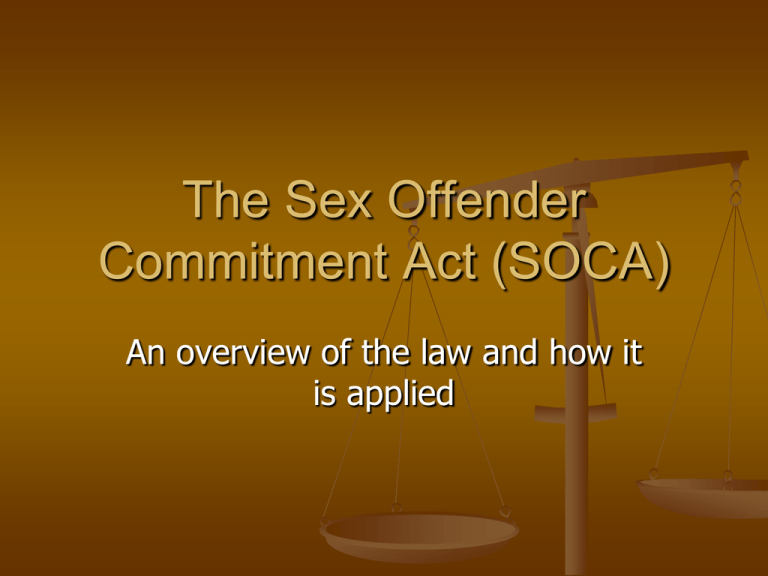
The Sex Offender
Commitment Act (SOCA)
An overview of the law and how it
is applied
Summary of SOCA
Purpose of the act is to provide for court-ordered
treatment of sex offenders who have completed their
sentences but continue to pose a threat of harm to
others.
It is the policy of this state that DSOs be encouraged to
seek voluntary treatment. SOCA provides for civil
commitment of DSOs.
The procedures in SOCA mirror those established in the
Mental Health Commitment Act and the language of
SOCA is incorporated into current statutes.
taken from the Nebraska Mental Health Commitment Act Reference Manual
Key Instructional Statutes
71-1204
71-1205
71-1206
71-946
83-174.01
83-174.02
71-1204
71-1204. Emergency protective custody;
dangerous sex offender determination;
written certificate; contents.
(1) A mental health professional who, upon
evaluation of a person admitted for emergency
protective custody under section 71-919,
determines that such person is a dangerous sex
offender shall execute a written certificate as
provided in subsection (2) of this section not
later than twenty-four hours after the
completion of such evaluation. A copy of such
certificate shall be immediately forwarded to the
county attorney.
71-1204 (continued)
(2) The certificate shall be in writing and shall include the following
information:
(a) The subject's name and address, if known;
(b) The name and address of the subject's spouse, legal counsel, guardian
or conservator, and next of kin, if known;
(c) The name and address of anyone providing psychiatric or other care or
treatment to the subject, if known;
(d) The name and address of any other person who may have knowledge
of the subject's mental illness or personality disorder who may be called as
a witness at a mental health board hearing with respect to the subject, if
known;
(e) The name and address of the medical facility in which the subject is
being held for emergency protective custody and evaluation;
(f) The name and work address of the certifying mental health professional;
(g) A statement by the certifying mental health professional that he or she
has evaluated the subject since the subject was admitted for emergency
protective custody and evaluation; and
(h) A statement by the certifying mental health professional that, in his or
her clinical opinion, the subject is a dangerous sex offender and the clinical
basis for such opinion.
71-1205
71-1205. Person believes another to be a dangerous sex offender;
notify county attorney; petition; when; contents.
(1) Any person who believes that another person is a dangerous sex
offender may communicate such belief to the county attorney. The filing of
a certificate by a law enforcement officer under section 71-919 shall be
sufficient to communicate such belief. If the county attorney concurs that
such person is a dangerous sex offender and that neither voluntary
hospitalization nor other treatment alternatives less restrictive of the
subject's liberty than inpatient or outpatient treatment ordered by a mental
health board is available or would suffice to prevent the harm described in
subdivision (1) of section 83-174.01, the county attorney shall file a petition
as provided in this section.
(2) The petition shall be filed with the clerk of the district court in any
county within: (a) The judicial district in which the subject is located; (b)
the judicial district in which the alleged behavior of the subject occurred
which constitutes the basis for the petition; or (c) another judicial district in
the State of Nebraska, if authorized, upon good cause shown, by a district
judge of the judicial district in which the subject is located. In such event,
all proceedings before the mental health board shall be conducted by the
mental health board serving such other county and all costs relating to such
proceedings shall be paid by the county of residence of the subject. In the
order transferring such cause to another county, the judge shall include
such directions as are reasonably necessary to protect the rights of the
subject.
71-1205 (continued)
(3) The petition shall be in writing and shall include the following
information:
(a) The subject's name and address, if known;
(b) The name and address of the subject's spouse, legal counsel,
guardian or conservator, and next of kin, if known;
(c) The name and address of anyone providing psychiatric or other
care or treatment to the subject, if known;
(d) A statement that the county attorney has probable cause to
believe that the subject of the petition is a dangerous sex offender;
(e) A statement that the beliefs of the county attorney are based on
specific behavior, acts, criminal convictions, attempts, or threats
which shall be described in detail in the petition; and
(f) The name and address of any other person who may have
knowledge of the subject's mental illness or personality disorder and
who may be called as a witness at a mental health board hearing
with respect to the subject, if known.
71-1206
71-1206. Mental health board proceedings;
commencement; petition; custody of subject;
conditions; dismissal; when.
(1) Mental health board proceedings shall be deemed to
have commenced upon the earlier of (a) the filing of a
petition under section 71-1205 or (b) notification by the
county attorney to the law enforcement officer who took
the subject into emergency protective custody under
section 71-919 or the administrator of the treatment
facility having charge of the subject of the intention of
the county attorney to file such petition. The county
attorney shall file such petition as soon as reasonably
practicable after such notification.
71-1206 (continued)
(2) A petition filed by the county attorney under section 71-1205 may contain a
request for the emergency protective custody and evaluation of the subject prior to
commencement of a mental health board hearing pursuant to such petition with
respect to the subject. Upon receipt of such request and upon a finding of probable
cause to believe that the subject is a dangerous sex offender as alleged in the
petition, the court or chairperson of the mental health board may issue a warrant
directing the sheriff to take custody of the subject. If the subject is already in
emergency protective custody under a certificate filed under section 71-919, a copy
of such certificate shall be filed with the petition. The subject in such custody shall be
held in an appropriate and available medical facility, jail, or Department of
Correctional Services facility. A dangerous sex offender shall not be admitted to a
medical facility for emergency protective custody unless a medical or psychiatric
emergency exists requiring treatment not available at a jail or correctional facility.
Each county shall make arrangements with appropriate facilities inside or outside the
county for such purpose and shall pay the cost of the emergency protective custody
of persons from such county in such facilities.
(3) The petition and all subsequent pleadings and filings in the case shall be entitled
In the Interest of . . . . . , Alleged to be a Dangerous Sex Offender. The county
attorney may dismiss the petition at any time prior to the commencement of the
hearing of the mental health board under section 71-1208, and upon such motion by
the county attorney, the mental health board shall dismiss the petition.
71-946
71-946. Appointment of counsel; procedure.
The appointment of counsel under section 71-945 shall be in accordance with the
following procedures:
(1) Except in counties having a public defender, upon the receipt from the mental
health board of a certificate for the appointment of counsel, the clerk of the district
court shall notify the district judge or the county judge of the county in which the
proceedings are pending of the receipt of such certificate. The judge to whom the
certificate was issued shall appoint an attorney to represent the person concerning
whom an application is filed before the mental health board, whereupon the clerk of
the court shall enter upon the certificate the name of the attorney appointed and
deliver the certificate of appointment of counsel to the mental health board. The clerk
of the district court or the clerk of the county court shall also keep and maintain a
record of all appointments which shall be conclusive evidence thereof. All
appointments of counsel under the Nebraska Mental Health Commitment Act or the
Sex Offender Commitment Act may be made at any time or place in the state; and
(2) In counties having a public defender, upon receipt from the mental health board
of a certificate for the appointment of counsel, the clerk of the district court shall
notify the public defender of his or her appointment to represent the person and shall
enter upon the certificate the name of the attorney appointed and deliver the
certificate of appointment of counsel to the mental health board.
83-174.01
83-174.01. Dangerous sex offender; terms, defined.
For purposes of sections 83-174 to 83-174.05:
(1) Dangerous sex offender means (a) a person who suffers from a mental illness
which makes the person likely to engage in repeat acts of sexual violence, who has
been convicted of one or more sex offenses, and who is substantially unable to
control his or her criminal behavior or (b) a person with a personality disorder which
makes the person likely to engage in repeat acts of sexual violence, who has been
convicted of two or more sex offenses, and who is substantially unable to control his
or her criminal behavior;
(2) Likely to engage in repeat acts of sexual violence means the person's propensity
to commit sex offenses resulting in serious harm to others is of such a degree as to
pose a menace to the health and safety of the public;
(3) Person who suffers from a mental illness means an individual who has a mental
illness as defined in section 71-907;
(4) Person with a personality disorder means an individual diagnosed with a
personality disorder;
(5) Sex offense means any of the offenses listed in section 29-4003 for which
registration as a sex offender is required; and
(6) Substantially unable to control his or her criminal behavior means having serious
difficulty in controlling or resisting the desire or urge to commit sex offenses.
83-174.02
83-174.02. Dangerous sex offender; evaluation; Department of
Correctional Services; duties; notice.
(1) The Department of Correctional Services shall order an evaluation of the following
individuals by a mental health professional to determine whether or not the individual
is a dangerous sex offender:
(a) Individuals who have been convicted of (i) sexual assault of a child in the first
degree pursuant to section 28-319.01 or (ii) sexual assault in the first degree
pursuant to section 28-319;
(b) Individuals who have been convicted of two or more offenses requiring
registration as a sex offender under section 29-4003 if one of the convictions was for
any of the following offenses: (i) Kidnapping of a minor pursuant to section 28-313,
except when the person is the parent of the minor and was not convicted of any
other offense; (ii) sexual assault in the first degree pursuant to section 28-319 or
sexual assault in the second degree pursuant to section 28-320; (iii) sexual assault of
a child pursuant to section 28-320.01; (iv) sexual assault of a child in the first degree
pursuant to section 28-319.01; (v) sexual assault of a child in the second or third
degree pursuant to section 28-320.01; (vi) sexual assault of a vulnerable adult
pursuant to subdivision (1)(c) of section 28-386; (vii) incest of a minor pursuant to
section 28-703; (viii) visual depiction of sexually explicit conduct of a child pursuant
to section 28-1463.03; or (ix) any offense that is substantially equivalent to an
offense listed in this section by any state, territory, commonwealth, or other
jurisdiction of the United States, by the United States Government, or by courtmartial or other military tribunal, notwithstanding a procedure comparable in effect to
that described in section 29-2264 or any other procedure to nullify a conviction other
than by pardon;
83-174.02 (continued)
(c) Individuals convicted of a sex offense against a minor who have refused to
participate in or failed to successfully complete the sex offender treatment program
offered by the Department of Correctional Services or the Department of Health and
Human Services during the term of incarceration. The failure to successfully complete
a treatment program due to time constraints or the unavailability of treatment
programming shall not constitute a refusal to participate in treatment; and
(d) Individuals convicted of failure to comply with the registration requirements of
the Sex Offender Registration Act who have previously been convicted for failure to
comply with the registration requirements of the act or a similar registration
requirement in another state.
(2) The evaluation required by this section shall be ordered at least one hundred
eighty days before the scheduled release of the individual. Upon completion of the
evaluation, and not later than one hundred fifty days prior to the scheduled release
of the individual, the department shall send written notice to the Attorney General,
the county attorney of the county where the offender is incarcerated, and the
prosecuting county attorney. The notice shall contain an affidavit of the mental
health professional describing his or her findings with respect to whether or not the
individual is a dangerous sex offender.
Directory/Mandatory distinction
Statutes can be either directory or
mandatory.
To determine of a statute is directory or
mandatory, look to the main objective of
the statute.
Is the prescribed duty essential to the main
objective of the statute?
Statutory timelines in §83-174.02 are
directory, not mandatory.
SOCA in practice
Timelines stated in Neb. Rev. Stat. §83-174.02 are directory and not
mandatory.
The authority of a county attorney to file a SOCA petition is not
exclusively triggered by a timely receipt of an evaluation and notice
pursuant to Neb. Rev. Stat. §83-174.02. Neb. Rev. Stat. §71-1205.
Petitions under the SOCA are civil in nature.
Motion to Discharge is not applicable in civil cases.
Continuances shall be liberally granted at the request of the subject.
Neb Rev. Stat. §71-950
A psychologist’s evaluation can be sufficient and probative of the
fact that a sex offender is dangerous to society.
Evidence must be examined in its entirety to determine of it is
sufficient as a matter of law to support Board findings.
State of Nebraska v. Christopher T.
(2011)
§43-247(3)(c) provides that the juvenile court shall have jurisdiction over
any juvenile who is mentally ill and dangerous as defined in 71-908.
71-908 is part of the MHCA that defines mentally ill and dangerous as
someone who presents (1) a substantial risk of serious harm to another
person or persons within the near future as manifested by evidence of
recent violent acts or threats of violence or by placing others in
reasonable fear of such harm; or (2) a substantial risk of serious harm to
himself or herself within the near future as manifested by evidence of
recent attempts at, or threats of, suicide or serious bodily harm or
evidence of inability to provide for his or her basic human needs,
including food, clothing, shelter, essential medical care, or personal
safety.
The burden of proof to show someone is mentally ill and dangerous
under the MHCA is clear and convincing evidence.
Although there is no explicit standard of proof under §43-247(3)(c), this
does not mean the standard “defaults” to beyond a reasonable doubt.
However, the burden may not be lessened from clear and convincing as
doing so would compromise the due process rights of the mentally ill
person.
D.I. v. Mental Health Board of the
Fourth Judicial District (2011)
There was a jurisdictional issue independent from the question of law
The State claimed the state Supreme Court did not have jurisdiction to hear
the appeal because SOCA does not give a right to appeal from a denial of a
motion for reconsideration.
Although SOCA does not explicitly provide for an appeal from §71-1219, §711214 provides that a subject committed under SOCA may appeal to the
district court from a §71-1209 treatment order. Further, a denial of a motion
for reconsideration is a final, appealable order, and affected a substantial right
of the appellant. Thus, an appellate court does have jurisdiction over appeals
from denials of motions for reconsideration.
The State bears the burden to show by clear and convincing evidence
that the subject remains mentally ill and dangerous.
Assignments of error that allege an insufficiency in the evidence
presented as to the existence of a less restrictive treatment option have
only been successful when there was no evidence presented that the
current treatment option was the least restrictive. In re Interest of O.S.
Testimony of a psychiatrist and findings by the Mental Health Board may
be sufficient to establish the clear and convincing evidence of the leastrestrictive treatment option.
S.C. Mental Health Board of the
Fifth Judicial District
An individual has no protected liberty interest in
obtaining sex offender treatment while incarcerated.
Thus, a substantive due process claim arising from a
failure to provide treatment while an individual is
incarcerated must fail.
While other states (for example, Colorado) make
treatment a statutory requirement for parole eligibility,
and thus afford the incarcerated person a liberty
interest in obtaining such treatment, Nebraska does
not make treatment a condition of release and thus
does not create a liberty interest on which a
substantive due process claim may stand.
Procedural due process requirements are satisfied by
having a hearing in front of the Mental Health Board.
S.J. v. Mental Health Board of the
Fourth Judicial District
In order for an individual to fit under the definition of DSO in §83174.01, the record must establish both a propensity (“likely to engage in
repeat acts of sexual violence”) as well as an inability to control that
propensity (“substantially unable to control his or her criminal behavior
means having serious difficulty in controlling or resisting the desire or
urge to commit sex offenses.”).
Due Process claims unsupported by the record will not be reviewed by
the court.
When SOCA is subjected to the three-pronged due process analysis (is
there a protected liberty interest at stake, if so what procedural
protections are required, and was there a denial of that process when
due) and if the challenge is raised against inpatient treatment, the first
prong will generally be met because SCOTUS held that where a patient is
committed to inpatient treatment, a liberty interest is implicated (see
Vitek v. Jones, 445 U.S. 480, 100 S.Ct. 1254, 63 L.Ed.2d 552 (1980),
requiring the consideration of prongs two and three. This case seems to
be a reaffirmation of the due process requirements that must be met
with inpatient treatment.
CONTACTS
Chris Seifert cseifert@lancaster.ne.gov
402-441-8216
Jeff Lux jeffrey.lux@douglascounty-ne.gov
402-444-3806
John Reisz jreisz@sarpy.com
402-593-4463









